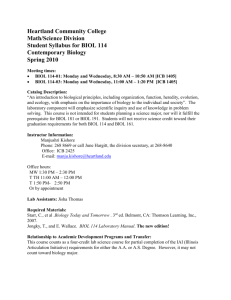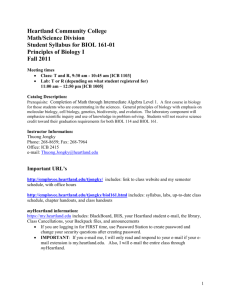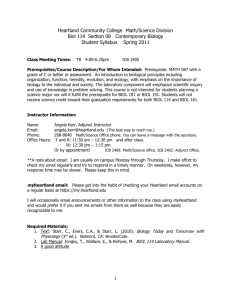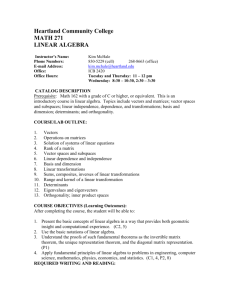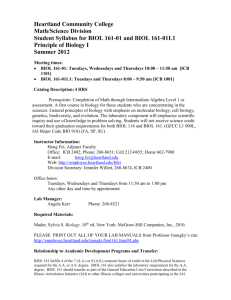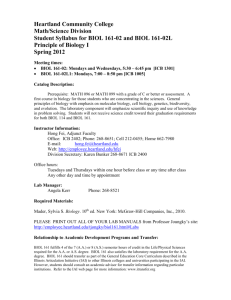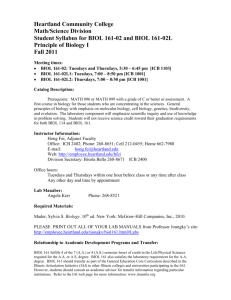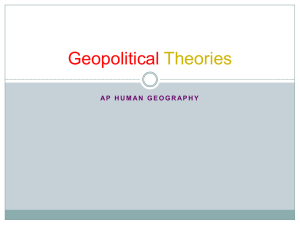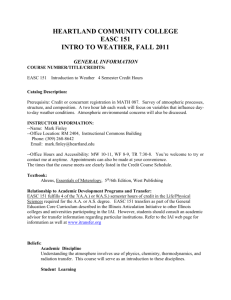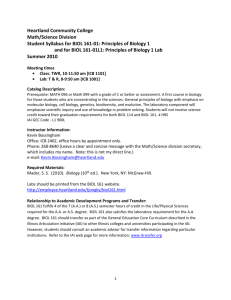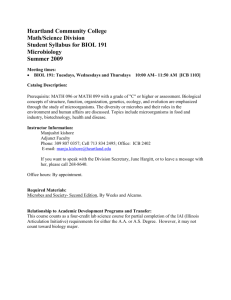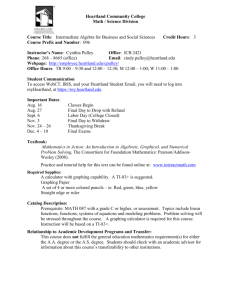BIOL 114-02 Fei (0216) - Heartland Community College
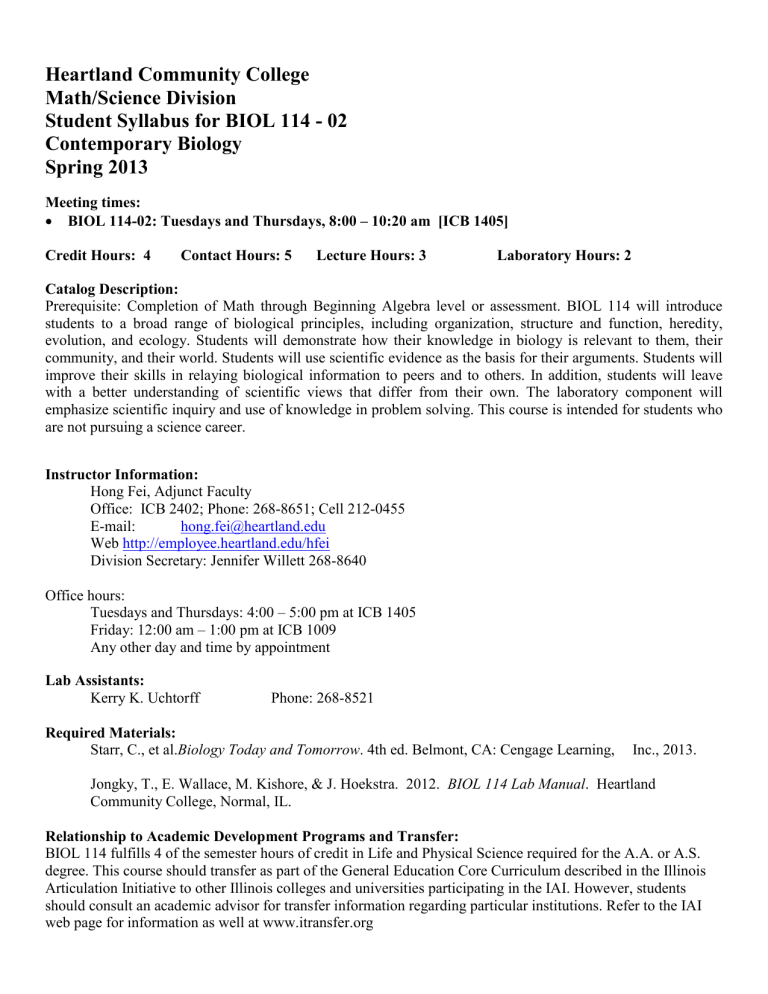
Heartland Community College
Math/Science Division
Student Syllabus for BIOL 114 - 02
Contemporary Biology
Spring 2013
Meeting times:
BIOL 114-02: Tuesdays and Thursdays, 8:00 – 10:20 am [ICB 1405]
Credit Hours: 4 Contact Hours: 5 Lecture Hours: 3 Laboratory Hours: 2
Catalog Description:
Prerequisite: Completion of Math through Beginning Algebra level or assessment. BIOL 114 will introduce students to a broad range of biological principles, including organization, structure and function, heredity, evolution, and ecology. Students will demonstrate how their knowledge in biology is relevant to them, their community, and their world. Students will use scientific evidence as the basis for their arguments. Students will improve their skills in relaying biological information to peers and to others. In addition, students will leave with a better understanding of scientific views that differ from their own. The laboratory component will emphasize scientific inquiry and use of knowledge in problem solving. This course is intended for students who are not pursuing a science career.
Instructor Information:
Hong Fei, Adjunct Faculty
Office: ICB 2402; Phone: 268-8651; Cell 212-0455
E-mail: hong.fei@heartland.edu
Web http://employee.heartland.edu/hfei
Division Secretary: Jennifer Willett 268-8640
Office hours:
Tuesdays and Thursdays: 4:00 – 5:00 pm at ICB 1405
Friday: 12:00 am – 1:00 pm at ICB 1009
Any other day and time by appointment
Lab Assistants:
Kerry K. Uchtorff Phone: 268-8521
Required Materials:
Starr, C., et al.
Biology Today and Tomorrow . 4th ed. Belmont, CA: Cengage Learning, Inc., 2013.
Jongky, T., E. Wallace, M. Kishore, & J. Hoekstra. 2012.
Community College, Normal, IL.
BIOL 114 Lab Manual . Heartland
Relationship to Academic Development Programs and Transfer:
BIOL 114 fulfills 4 of the semester hours of credit in Life and Physical Science required for the A.A. or A.S. degree. This course should transfer as part of the General Education Core Curriculum described in the Illinois
Articulation Initiative to other Illinois colleges and universities participating in the IAI. However, students should consult an academic advisor for transfer information regarding particular institutions. Refer to the IAI web page for information as well at www.itransfer.org
Basic requirements and make-up policies:
1.
Wireless devices and computer are not to be used in class room during lecture and discussions.
2.
It is the responsibility of the students to check their “my heartland” email for notifications.
3.
There are quiz make-ups. It will be in the test center only in the period of time between the quiz and the time next class meets.
4.
There are NO make-ups for in-class activities.
5.
There are NO lab make-ups.
6.
There is make-up for the Journal Club. The make-up work will earn at most 90%.
7.
The student will complete most labs before leaving class. If a lab assignment has to be finished outside of class, the assignment is due the next class day that the student comes to class. Only students who attend lab can finish the lab assignment.
8.
In extreme cases (such as, documented severe illness, documented accident, or military duties) when a student must miss class for more than 2 weeks , the student must contact the instructor as soon as possible to discuss the best course of action.
Course/Lab Outline:
1. Introduction to the science of biology
2. Basics of biochemistry
3. Introduction to cell biology and energy use
4. Genetics a. DNA and gene expression. b. Inheritance.
5. Animal structure, function and human health a. Musculoskeletal system b. Circulation and respiration c. Digestion, nutrition, and excretion d. Nervous and endocrine systems e. Reproduction and development
6. Evolution a. Evidence for evolution b. Processes of evolution
7. Ecology a. Population and community ecology b. Ecosystem ecology and environmental issues
8. Microbiology
a. Bacteria, Viruses, Protist and Fungi structure and impact on society
Important URL
http://www.heartland.edu/asc/ includes: information about library, tutoring and testing services, computing lab, writing services and disability support services.
my Heartland information: https://my.heartland.edu
includes: access to IRIS, your Heartland student e-mail, Black Board, your Backpack files, the library, Class Cancellations, and announcements
If you are logging in for FIRST time, use Password Station to create password and change your security questions after creating password.
IMPORTANT : If you choose to e-mail me, I will only read and respond to your e-mail if your e-mail extension is my.heartland.edu. Also, I will e-mail the entire class through my Heartland periodically if I need to tell the whole class something but forgot to mention during the face-to-face meeting.
Beliefs about Student Learning:
Students must take responsibility for their own learning. Part of that responsibility is attendance and active participation in all lecture sessions. Taking notes during lecture, asking pertinent questions, participation in group activities and completion of written assignments, when required are a part of that participation. The student must read the assigned text, and spend enough time in independent study to master the material. It is a well established fact that in order to master a course, the student must spend at least 2 to 3 hours of outside study for each 1 hour spent in class. If the student is having difficulty with a particular topic it is his or her responsibility to ask questions or consult with the teacher to gain additional help in that topic.
The following activities will help you in learning the material:
A. Attend the lectures on the current topic. Not attending lectures punctually will negatively impact grades.
B. Take thorough notes during lecture.
C. Study the required textbook pages.
D. Complete all activities for each unit and hand in all assignments on time.
E. Participate in group discussions and activities.
F. Take all exams as scheduled.
G. Review the corrected tests in class after they are returned, using the opportunity to master the material.
Beliefs about Teacher's Role:
It is the teacher's responsibility to facilitate the student's learning. This is accomplished by conducting lectures and discussions in an organized manner and preparing assignments which enhance that learning. The teacher also is responsible for clearly stating course objectives, and evaluation of student progress based on those objectives. While some class time should be taken to answer questions and clarify lecture material, the teacher must move on to other topics in a timely fashion in order to be fair to students who are ready to move on as well. However, the teacher must be available outside of the classroom to aid individuals who need more help on a particular topic, or to direct them to tutorial assistance.
HCC General Education Learning Outcomes: Because BIOL 114 is part of HCC’s General Education Program, assessments will also measure the following four General Education Outcomes:
Critical Thinking 1 : Students gather knowledge, apply it to a new situation, and draw reasonable conclusions in ways that demonstrate understanding.
Critical Thinking 3 : Students generate an answer, approach, or solution through an effective synthesis of diverse sources and arguments and provide a rationale.
Communication 2 : Students effectively deliver a message via various channels/modalities.
Diversity 1 : Students are receptive to beliefs and values that differ from their own.
Course Learning Outcomes:
1.
Students hypothesize, experiment, gather data, and formulate conclusions.
2.
Students evaluate the validity of biology-related results and conclusions that are presented in the media and other settings.
3.
Students relate biological concepts to their daily life and to the world around them.
4.
Students synthesize information from various sources to generate an essay, poster, oral presentation, or other product.
5.
Students demonstrate awareness of issues related to individual and community health.
6.
Students demonstrate awareness of environmental issues related to biology
.
Range of Assessment Methods
Labs, individual or group projects, case studies, concept maps, service learning, presentations, current news article summary and analysis papers, worksheets, quizzes, and exams.
Incomplete Grade
An Incomplete grade may be justified to a student if the student encounters extreme circumstances (e.g., serious illness, accident, death or serious illness in the immediate family) toward the end of the semester and is unable to complete the semester. The student must be in a position to pass the class if the Incomplete is given. The student must sign a form requiring him/her to finish the class by next semester.
Required Writing and Reading
The student will read the textbook, articles, and possible case studies. The student will write summaries for articles and possible projects and/or portfolio, and students will write answers for various worksheets and lab questions.
Academic Integrity
The Heartland Community college policies on academic integrity and/or plagiarism from HCC syllabus guidelines are quoted below. In this course, violations of the policy will automatically result in a “0” on the assignment and may result in an “F” for the course.
Academic integrity is a fundamental principle of collegial life at Heartland Community College and is essential to the credibility of the College’s educational programs. Moreover, because grading may be competitive, students who misrepresent their academic work violate the rights of their fellow students. The College, therefore, views any act of academic dishonesty as a serious offense requiring disciplinary measures, including course failure, suspension, and even expulsion from the College. In addition, an act of academic dishonesty may have unforeseen effects far beyond any officially imposed penalties.
Violations of academic integrity include, but are not limited to cheating, aiding or suborning cheating or other acts of academic dishonesty, plagiarism, misrepresentation of data, falsification of academic records or documents and unauthorized access to computerized academic or administrative records or systems.
Definitions of these may be found in the college catalog.
Plagiarism
Plagiarism is the presenting of others’ ideas as if they were your own. When you write a paper, create a project, do a presentation or create anything original, it is assumed that all the work, except for that which is attributed to another author or creator, is your own. Plagiarism is considered a serious academic offense and may take the following forms: o Copying word-for-word from another source and not giving that source credit. o Paraphrasing the work of another and not giving that source credit. o Adopting a particularly apt phrase as your own o Using an image or a copy of an image without crediting its source o Paraphrasing someone else’s line of thinking in the development of a topic as if it were your own. o Receiving excessive help from a friend or elsewhere, or using another project as if it were your own.
Note that word-for-word copying is not the only form of plagiarism. The penalties for plagiarism may be severe, ranging from failure on the particular piece of work, failure in the course or expulsion from school in extreme cases. Real or pretended ignorance of what constitutes plagiarism will not excuse students from the penalties of such conduct.
[Adapted from the Modern Language Association’s MLA Handbook for Writers of Research Papers. New
York: MLA, 1995: 26]
Academic Support Center Services
http://www.heartland.edu/asc/
1.
Library
The Library, located in the Student Commons Building at the Raab Road campus, provides Heartland students with a full range of resources including books, online journal databases, videos, newspapers, periodicals, reserves, and interlibrary loan. Librarians are available to assist in locating information.
For more information please call the Library (309) 268-8200 or (309) 268-8292. http://www.heartland.edu/LIBRARY/index.html
2.
Tutoring Services
Heartland Community College offers tutoring in various forms at no cost to Heartland students at the
Tutoring and Testing Center in Normal and at the Pontiac and Lincoln Centers. Tutors are available at convenient times throughout the week. Study groups are also available by request. For more information about services available at each location, please call the Tutoring and Testing Center in Normal at (309)
268-8231, the Pontiac Center at (815) 842-6777, or the Lincoln Center (217) 735-1731. http://www.heartland.edu/asc/tutor.html
3.
Testing Services
The Tutoring and Testing Center provides a secure testing environment for students who are enrolled in online, hybrid, and other distance learning courses; have a documented disability; or need to take a make-up exam. Testing accommodations for students having documented disabilities must be arranged by the student through the Office of Disability Services, and Testing Services will only administer make-up exams at the request of the instructor. Contact Testing Services at (309) 268-8231 for more information. http://www.heartland.edu/asc/testing.html
Tentative Schedule for Bio 114
Week 1, January 15, 17
Unit 1 - Cells:
Scientific Methods
Biochemistry of amino acids, carbohydrates, nucleic acids and protein
Lab 1: Scientific Method
Week 2, January 22, 24
Basic unit of life - the cell
Comparing prokaryotes and eukaryotes
Lab 2: Microscope
Week 3, January 29, 31
Quiz for unit 1 – (1/31)
Unit 2 - Genetics:
Mitosis and meiosis; simulation of mitosis and meiosis
Lab 3: Life
Lab 4: Cells
Week 4, February 5, 7
Cell cycle and regulation
Lab 5: DNA
Week 5, February 12, 14
Human genetics - problems and pedigree
Lab 6: DNA to Protein
Lab 7: Mitosis and Meiosis
Week 6, February 19, 21
DNA structure and function
Lab 8: Human Sex
Week 7, February 26, 28
Journal Club (2/26)
Molecular genetics: Gene expression, functional genome
Lab 9: Genetics
Week 8, March 5, 7
Gene Expression: Transcription and translation - Synthesis of RNA and protein
Quiz for unit 2 – (3/7)
Mid Term: There is NO separate midterm exam
SPRING BREAK, NO CLASS: March 12, 14
Week 9, March 19, 21
Unit 3 - Physiology:
Homeostasis and Form & Function
The Skeletal System
Lab 10: Skeletal System
Week 10, March 26, 28
Unit 3 - Physiology:
The Circulatory System
Lab 11: Circulatory System
Week 11, April 2, 4
Unit 3 - Physiology:
The Digestive System
Lab 12: Nutrition
Week 12, April 9, 11
Unit 3 - Physiology:
The Digestive System
Lab 13: Calories, Calories
Week 13, April 16, 18
Quiz for unit 3 – (4/18)
The Nervous System
Lab 14: Senses
Week 14, April 23, 25
Unit 4 – Evolution, Microbiology, Ecology
Lab 15: Natural Selection
Week 15, April 30, May 2
Unit 4 – Evolution, Microbiology, Ecology
Lab 16: Bacteria
Lab 22: Population Ecology
Week 16, May 7
Unit 4 – Evolution, Microbiology, Ecology
Observe results of Lab 16
Final: May 14 at 8:00 – 9:20 am
Grade Calculation:
Each unit = 100 points
Total points possible for the five units = 400 points (65%)
Journal Club presentation = 100 points (15%)
*During the semester, five or more journal articles will be distributed for presentation and discussion. The presentation and discussion will be graded.
Each lab report = 10 points
Total points possible for the lab part = 170 points (20%)
Total points possible = 670 points
Total points will be converted into a 100% scale.
Example:
If you got a total points of 350 from the quizzes and 155 points from the lab reports, 95 points from the presentation, your total points earned = (350 + 155 + 95) = 600; Your final grade = 600 x 100/670 = 90
Final Grade:
A = 90+ B = 80+ C = 70+ D = 60+ F = 60-
The Journal Club
In biology, we encounter a lot of facts, concepts and theories. It makes little sense to memorize facts without understanding how they were discovered and why the theories are correct. It is important that at the college level, students read and present articles from original, peer reviewed journals and understand them as the recognized source of information for scientists or scientific community at large.
1. Objectives
Students will gain insight to the process of scientific inquiries.
2. Procedure:
At the beginning of unit 2, you will receive a series of scientific journal articles that are simplified version of historical (Nobel Prize winning) discoveries. Because they are all discoveries that revolutionized biotechnology and medicine, they will give you ideas of "how" and "why" behind theories. Because they are simplified, technical details are avoided.
All students will be given articles to read. However, each group of students will have an article to present. They will present to the class the following aspects of the article.
1) Why the research was done? What problem they hoped to solve? What background work had been done?
2) Describe the methods. Why did they choose this particular method? What was the break through in this methodology?
3) Explain the results. If there are data, tables, or figures, you are expected to explain them to the audience.
You should show the data as if you were presenting them to the scientific community, using visual aids.
4) What were the conclusions? What was the significance of this work? Are there potential applications in research and medicine?
5) Critique the research. What is the next step if you were the one who finished the study?
3. Evaluation
Students are encouraged to discuss with instructor before the presentation.
Total point of 100 can be earned towards the final grade.
Presentation: Concise and accurate
Content: Include the above aspects
Discussion: Answering questions from audience
20%
60%
20%
Safety Rules for Biology Lab
1. Emergency shower and emergency eye wash are located at the side of classroom.
2. Fire extinguisher is located in the classroom. Familiarize yourself with the location.
3. Safety information about chemicals used in labs, including chemical storage, poison control and treatment, is on file and available in binder in the storage room. These papers are called Material Safety Data Sheets (MSDS) that are required by law to be available for inspection by users.
4. Eye protection, gloves, aprons will be provided when exercise necessities; however, they are available at all times upon request.
5. Always ware gloves when handling chemicals.
6. Dispose hazardous material in special containers.
7. Dispose sharps (needles, blades) in sharp container.
8. Dispose bacteria culture in biohazard bags.
9. Rinse with copious amount of water when chemicals spilled on skin.
10. Handling vaporous material in fume hood.
11. Clean up work area so next time or next person will not touch chemicals or microbes.
12. Report accident immediately.
